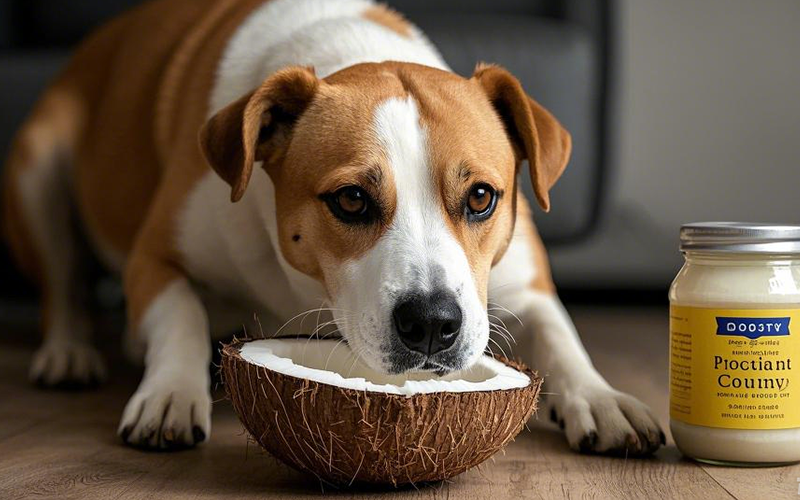Can Dogs Eat Coconut Oil? Benefits, Risks, and How to Use It Safely
- 3 Mar 2025 10:29
Coconut oil has gained popularity as a natural supplement for dogs, but is it really safe? The short answer is yes, dogs can eat coconut oil in moderation. It offers several health benefits, but too much can cause digestive issues.
Let’s explore the benefits, risks, and the best ways to feed coconut oil to your furry friend.

Health Benefits of Coconut Oil for Dogs
🌿 Supports Skin & Coat Health – Coconut oil contains lauric acid, which has antibacterial and moisturizing properties that can help with dry skin, itchiness, and allergies.
🌿 Boosts Immune System – The antioxidants in coconut oil help fight inflammation and infections.
🌿 Aids Digestion – It can improve gut health and help with constipation and mild digestive issues.
🌿 Supports Brain Function – Some studies suggest that coconut oil’s medium-chain triglycerides (MCTs) may support cognitive function in senior dogs.
🌿 Freshens Breath – Coconut oil has natural antibacterial properties, which may reduce bad breath.
🌿 Natural Flea & Tick Repellent – When applied topically, coconut oil may help repel fleas and ticks.
Potential Risks of Coconut Oil for Dogs
⚠ High in Fat & Calories – Coconut oil is pure fat, so too much can contribute to weight gain and obesity.
⚠ May Cause Stomach Upset – Some dogs may experience diarrhea, vomiting, or greasy stools if they consume too much at once.
⚠ Not Suitable for Dogs with Pancreatitis – Due to its high-fat content, coconut oil should be avoided for dogs with pancreatitis or fat-sensitive diets.
⚠ Allergic Reactions – Although rare, some dogs may have an allergy to coconut oil.
How to Safely Feed Coconut Oil to Dogs
To avoid stomach upset, introduce coconut oil gradually into your dog’s diet.
✅ Recommended Dosage
🐶 Small dogs (under 15 lbs) – Start with ¼ teaspoon per day and gradually increase to 1 teaspoon.
🐶 Medium dogs (15-50 lbs) – Start with ½ teaspoon per day and gradually increase to 1-2 teaspoons.
🐶 Large dogs (50+ lbs) – Start with 1 teaspoon per day and gradually increase to 1 tablespoon.
Tip: If your dog has never had coconut oil before, start with a tiny amount and monitor for any digestive issues.
Best Ways to Give Coconut Oil to Your Dog
✔ Mix into Dog Food – Stir a small amount into their kibble or wet food.
✔ Spread on Treats – Coat their favorite treat with a little coconut oil.
✔ Use as a Homemade Dog Treat Ingredient – Add coconut oil to homemade dog biscuits or frozen treats.
✔ Apply to Skin & Coat – Massage a small amount onto your dog’s dry skin or cracked paw pads for extra moisture.
Can Dogs Eat Coconut Oil Every Day?
Dogs can eat small amounts of coconut oil daily or a few times per week. However, it’s best to rotate it with other healthy fats (like fish oil) to prevent excessive fat intake.
Final Verdict: Can Dogs Eat Coconut Oil?
✅ Yes, in moderation! Coconut oil is safe for dogs and offers skin, digestive, and immune benefits. However, it should be fed in small amounts to avoid weight gain or stomach issues.
For personalized pet nutrition guidance, check out PettureX, an AI-powered pet health assistant that offers 24/7 online pet consultations and pet image recognition to help you keep your furry friend happy and healthy!
Related

Why is Regular Dog Grooming So Important?
- 21 Jun 2025
Can Dogs Eat Kiwis? A Vet-Approved Guide to This Fuzzy Fruit
- 10 Jun 2025
Can Dogs Eat Curry? Unpacking Risks, Benefits, and Safe Alternatives for Your Canine Companion
- 3 Jun 2025
Can Dogs Eat Cooked Carrots? A Crunchy & Colorful Canine Query!
- 29 May 2025
Can Dogs Eat Cooked Cabbage? Unveiling the Crunchy Truth for Your Canine!
- 29 May 2025
Can Dogs Eat Citrus? Peeling Back the Zesty Truth for Your Pup!
- 28 May 2025
Can Dogs Eat Cinnamon Applesauce (A Little Bit)? The Sweet and Spicy Truth!
- 28 May 2025
Can Dogs Eat Chorizo? Sizzling a Warning for Your Furry Friend!
- 27 May 2025
Can Dogs Eat Chili? A Spicy Topic for Canine Consumption!
- 27 May 2025
Can Dogs Eat Raw Chicken? Unveiling the Risks and Realities
- 26 May 2025
